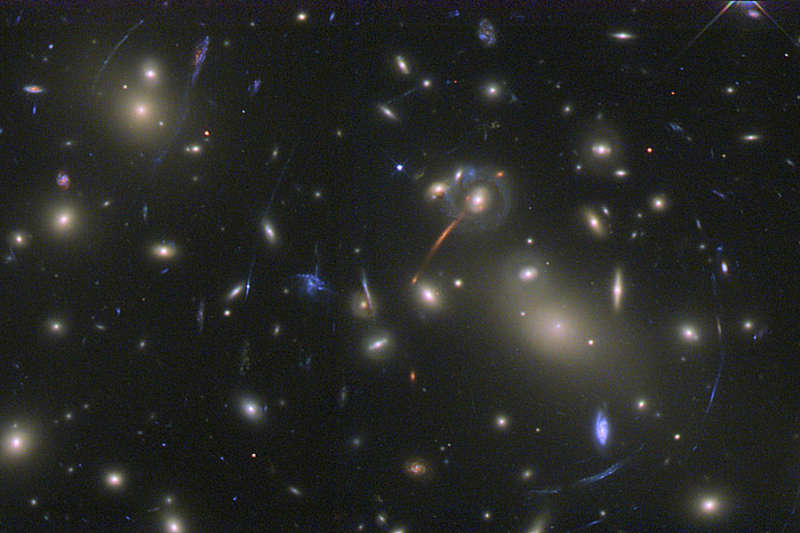Credit & Copyright: Andrew Fruchter
(STScI) et al.,
WFPC2,
HST,
NASA
Digitally reprocessed:
Al Kelly
Explanation:
What are those strange filaments?
Background galaxies.
Gravity can bend light, allowing huge clusters of galaxies
to act as telescopes, and distorting images of background galaxies into elongated
strands.
Almost all of the bright objects in this
Hubble Space Telescope image are galaxies in the
cluster
known as Abell 2218.
The cluster is so massive and so compact that its
gravity bends and focuses the light
from galaxies that lie behind it.
As a result,
multiple images of these background
galaxies are distorted into long faint arcs -- a simple
lensing effect analogous to viewing distant street
lamps through a glass of
wine.
The
cluster of galaxies Abell 2218 is itself about three billion
light-years away in the northern constellation of the Dragon
(Draco).
The power of this massive cluster telescope has
allowed astronomers to detect a galaxy at the distant
redshift of 5.58.
1999 2000 2001 2002 2003 2004 2005 2006 2007 2008 2009 2010 2011 2012 2013 2014 2015 2016 2017 2018 2019 2020 2021 2022 2023 2024 2025 |
Январь Февраль Март Апрель Май Июнь Июль Август Сентябрь Октябрь Ноябрь Декабрь |
NASA Web Site Statements, Warnings, and Disclaimers
NASA Official: Jay Norris. Specific rights apply.
A service of: LHEA at NASA / GSFC
& Michigan Tech. U.
|
Публикации с ключевыми словами:
Abell 2218 - gravitational lens - cluster of galaxies - Скопление галактик - гравитационное линзирование - далекие галактики
Публикации со словами: Abell 2218 - gravitational lens - cluster of galaxies - Скопление галактик - гравитационное линзирование - далекие галактики | |
См. также:
Все публикации на ту же тему >> | |
